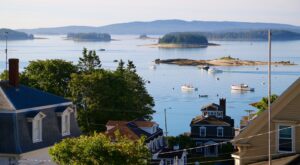Collaborating Toward Climate Solutions
 Institution: University of Maine
Institution: University of Maine
Sponsor: Senator George J. Mitchell Center for Sustainability Solutions and Maine Sea Grant
Engaging with coastal communities to identify barriers, build capacity and provide opportunities to mitigate, adapt and build resilience to climate change.
Efforts in Maine to confront climate change include an expanding cast of environmental advocacy organizations, stewardship programs, policy institutions, people’s coalitions and individual pioneer communities. Together, these leaders have generated sweeping interest in place-based mitigation, adaptation and resilience throughout Maine.
Since 2010, Maine’s Climate Change Adaptation Providers Network (CCAP) has sought to provide a gathering space for such initiatives and knowledge sharing. This group of 75 members representing 32 agencies, research and nonprofit organizations has been effective as a boundary-spanning organization and has collated an inventory of more than 80 municipal-scale climate change adaptation efforts that now act as case studies for broader implementation. Fervor for action on climate change has been bolstered by Governor Mills and coordinated efforts of the inaugural Maine Climate Council.
The research and engagement of Collaborating Toward Climate Solutions (CTCS) is designed to support on-the-ground problem-solving for the complex challenges that communities face, which are increasingly dominated by flooding, sea level rise, storms, drought, heat waves, ocean acidification and invasive species.
The research team is working closely with municipal officials in both Passamaquoddy and Penobscot Bays to co-develop strategies and extension/assistance services to support communities in adapting to the local impacts they are experiencing. This includes learning about community priorities and challenges and identifying potential service-provider partners, best practices, and the potential for networks that enable towns to connect with peer communities.
Knowledge of town governance, local issues, planning, financing and community goals are essential for strategies that weave climate change resilience into local decision-making. The research team is working directly with local leadership to develop technical and strategic assistance for communities, and to learn firsthand what resources and support are most helpful. The aim is to build connections among coastal communities as well as with the Maine Climate Council and Climate Change Adaptation Providers Network.
Students from UMaine Machias, Bowdoin and Middlebury Colleges have worked with the research team to investigate town planning documents and compile actions already underway to respond to risks related to climate change. Ongoing interviews with town managers, code enforcement officers and conservation commissions have bolstered the baseline knowledge for community engagement with climate change. These findings along with a longitudinal study on The State of Adaptation Planning in Maine’s Coastal Communities (Johnson et. al. 2019) describe how communities face problems of scarce resources for implementing projects and a dearth of technical expertise to oversee strategic planning and implementation.
Community-specific engagement and sub-regional workshops are planned to address these challenges. One research focus is to consider opportunities where community governance, as it relates to climate change preparedness, will interface with a diversity of key players, power dynamics, constraints, and local and non-local engagement.
Team Leader
- Esperanza Stancioff, Extension Professor, Climate Change Lead, UMaine Cooperative Extension/Maine Sea Grant
Team Members
- Eileen Johnson, Lecturer and Program Manager in Environmental Studies, Bowdoin College
- Parker Gassett, Maine Sea Grant Community Climate Resilience Professional & UMaine Ph.D. Student
- Tora Johnson, Director, GIS Laboratory and Service Center & Chair, Environmental and Biological Sciences Division, University of Maine Machias
- Nathan Robbins, Climate Change Specialist, Maine Department of Environmental Protection
- Ivan Fernandez, Distinguished UMaine Professor, School of Forest Resources & Climate Change Institute
Advisors
- Jeremy Martin, Town Planner, Camden
- Julie Rosenbach, Sustainability Director, City of South Portland
- Dave Kinney, Town Manager, Lincolnville
- Julie Hashem, Community Development Director, City of Rockland
- Judy East, Executive Director, Maine Land Use Planning Commission and Co-chair, Community Resilience, Emergency Management and Public Health Working Group
- Chris Johnson, Sipayik Environmental Ecology Manager, Pleasant Point Passamaquoddy Reservation
- Renee Gray, Town Manager, Lubec
- William MacDonald, Washington County Council of Governments
- Other community leaders from western Penobscot Bay and Passamaquoddy Bay
Resources
- Parker Gassett: Coming home to help ‘craft the best possible future for Maine’ (August 2021)
